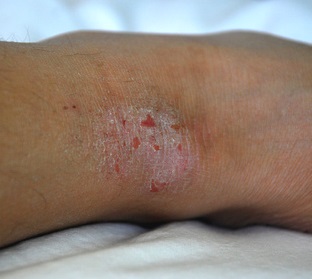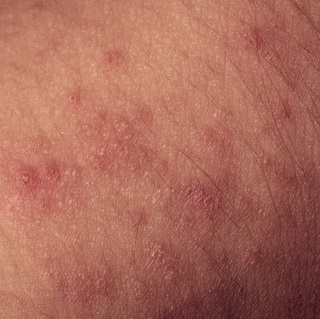We are often asked about the differences between psoriasis vs eczema. While they are both skin conditions and sometimes look similar, they are caused by different things and are often treated differently. We’ll tell you about some of the most important similarities and differences between the two conditions. If you’re not sure which condition you have, see your doctor get an accurate diagnosis.
Symptoms of Eczema vs Psoriasis
The symptoms of eczema and psoriasis are similar but there are some important differences.
Appearance – There are several types of psoriasis and different types look somewhat different. Most common is plaque psoriasis, in which large reddened areas appear on the skin, covered with silvery or whitish scales. Eczema sometimes resembles plaque psoriasis, but without the scales. Dry, flaky skin may occur with eczema, however. Pustular psoriasis causes pus-filled blisters, but blisters do not occur with eczema. Here are some pictures to compare:
| Psoriasis | Eczema |
 |  |
 |  |
 |  |
Other symptoms – Intense itching is common with both eczema and psoriasis. Psoriasis is also painful in some cases. People with erythrodermic psoriasis also have rapid heartbeats and unstable body temperatures, which does not occur with eczema. Erythrodermic psoriasis is fairly rare, though.
When symptoms usually begin – Eczema often starts in early childhood and can even begin in infancy, though it can also begin later in life, and it often improves as people get older. Psoriasis, on the other hand, usually begins in the teen years or early adulthood and does not necessarily improve with age.
Treating Psoriasis vs Eczema
Knowing the difference between eczema vs psoriasis is important when it comes to treatment. While similar treatments may be used at times for both conditions, choosing the best treatment and the right dose depends on knowing which condition you have.
Topical medications – Topical medications are often the first thing tried for eczema and for some forms of psoriasis. Corticosteroid creams are sometimes prescribed for both conditions, but there are other types of topical medications that may also be prescribed for psoriasis, including creams containing vitamin D, topical retinoids and a medication called anthralin which normalizes DNA activity in skin cells. It’s important to differentiate between psoriasis vs eczema while using topical medications because not only will many of the medications commonly used for psoriasis not help if you have eczema, they can potentially lead to serious side effects and you don’t want to take that risk if you can avoid it.
Oral medications – Oral medications are often only prescribed if topical treatments haven’t been effective. Oral medications for eczema and psoriasis may include oral steroids, but beyond that, it becomes important to differentiate between psoriasis vs eczema because different prescription drugs are used for each condition and those drugs can have serious side effects, so you definitely don’t want to take the wrong ones. For instance, retinoids may be taken orally to treat psoriasis, but they can cause serious birth defects if women become pregnant within three years of taking them, according to the Mayo Clinic. Immunomodulators like tacrolimus or pimecrolimus may be prescribed for severe cases of eczema that do not respond to other treatments, but these drugs can cause serious side effects, including hypertension, diabetes, and possibly even lymphoma.
Natural Treatments – Some people prefer to try natural treatments instead of prescription medications and many of the same natural remedies are often recommended for both eczema and psoriasis. If you’re looking for a natural treatment for psoriasis, though, our favorite is Terrasil Psoriasis Therapy Max. It’s specially formulated to relieve the symptoms of psoriasis, with natural ingredients like volcanic clay, jojoba seed oil, peppermint oil, and essential minerals like zinc and magnesium that are needed for healthy skin. To learn more about our top recommended natural treatment for psoriasis, just follow the link.
Here is more information on eczema treatment.
Mayo Clinic: Psoriasis Treatment
